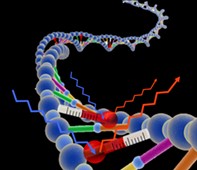RESEARCH PROGRAMMES
P3: Nanomedicine against cancer and infection
RESEARCH SUPERVISOR(S)
Dr Sebastian A. Thompson
Research Group website: https://thompson-lab.net
RESEARCH TOPIC DESCRIPTION
Our laboratory located at IMDEA Nanociencia is focused on intracellular temperature measurements. We strongly believe that intracellular temperature can be used as source of important information for both disease diagnostic and treatment (theragnostic). The lab research lines involve the development of optics nanothermometers and their applications in cell culture, animals and, in the future, clinical applications. Currently, the main research area is the cancer discrimination based on intracellular temperature measurements. Together with this, the development of nanoparticles capable of measure intracellular temperature and generate heat simultaneously is performed to induce selective cancer cell death. Our lab and research lines combine Optics, Nanotechnology and Molecular Biology, each of the play a fundamental role.
The applicant is expected to write an interdisciplinary research proposal in the field of intracellular temperature measurements to diagnose or/and to treat cancer or inflammatory conditions to metabolic disorders. We can work with simulation (simulate the performance of nanothermometers), we can do nanotechnology experiments (design new nanothermometers), cell culture experiments (to unravel diseases mechanism based on intracellular temperature) and animal experiments (treat diseases based on intracellular temperature).
The latest publications from our lab are:
- An anisotropy-based fluorescent tracker of cellular activity. Rodriguez G Spicer, CM Garcia-Abad, E Alejo, S Thompson. Subbmitted to Nature Photonics.
- Tryptophan-containing proteins as label-free nanothermometers. G Spicer, CM Garcia-Abad, E Alejo, S Thompson. arXiv: 2021.
- Harnessing DNA for Nanothermometry. G Spicer, S Gutierrez‐Erlandsson, R Matesanz, H Bernard, A Adam and S. Thompson Journal of Biophotonics 12020.
- Universal guidelines for the conversion of proteins and dyes into functional nanothermometers. G Spicer, A Efeyan, AP Adam, SA Thompson Journal of biophotonics 12 (9).
POSITION DESCRIPTION
The applicant is expected to understand that science is nowadays interdisciplinary, the laboratory combines Optics, Nanotechnology and Molecular Biology. A typical background would be interdisciplinary (or willing to work in an interdisciplinary project) with knowledge in more that one of the aforementioned fields (Physics: Optics, theory, and simulations; Molecular Biology: Cancer research, inflammatory conditions to metabolic disorders; Chemistry: Nanotechnology, Analytic, Organic and Biochemistry).
PARTNER ORGANIZATIONS
Based on the research proposal, we will collaborate with:
- Molecular Biology: Dr Alejo Efeyan: Metabolism and Cell Signaling Laboratory. Group leader – CNIO (Madrid Spain).
- Inflammatory conditions to metabolic disorders: Dr Alejandro Adam. Albany Medical College Group leader. Albany, NY (USA).
- Physics: NanoBig. Autonomous University of Madrid (Madrid).
- Dr Jana Nieder International Iberian Nanotechnology Laboratory (Braga, Portugal).
- Nanotechnology: Dr. Roberto de la Rica – Bionano. Balearic Islands Health Research Institute

Nanoparticles capable of diagnose and treat cancer.

Intracellular temperature measurements.

DNA as nanothermometer
